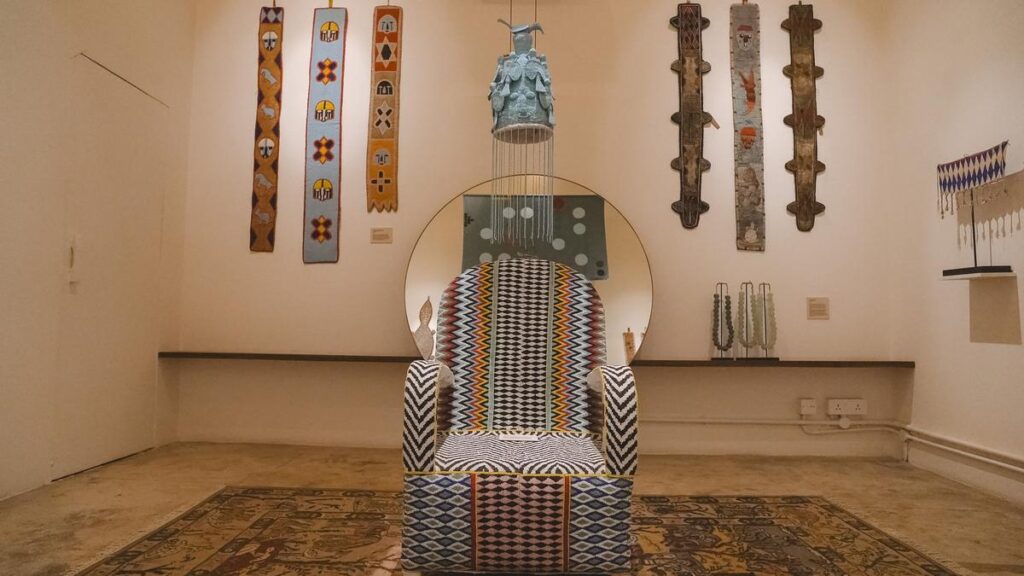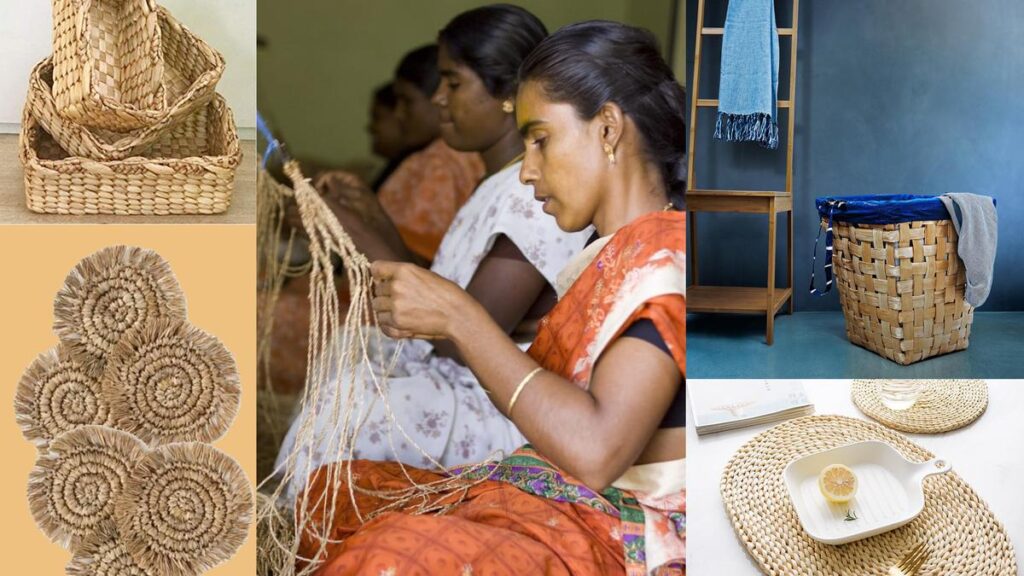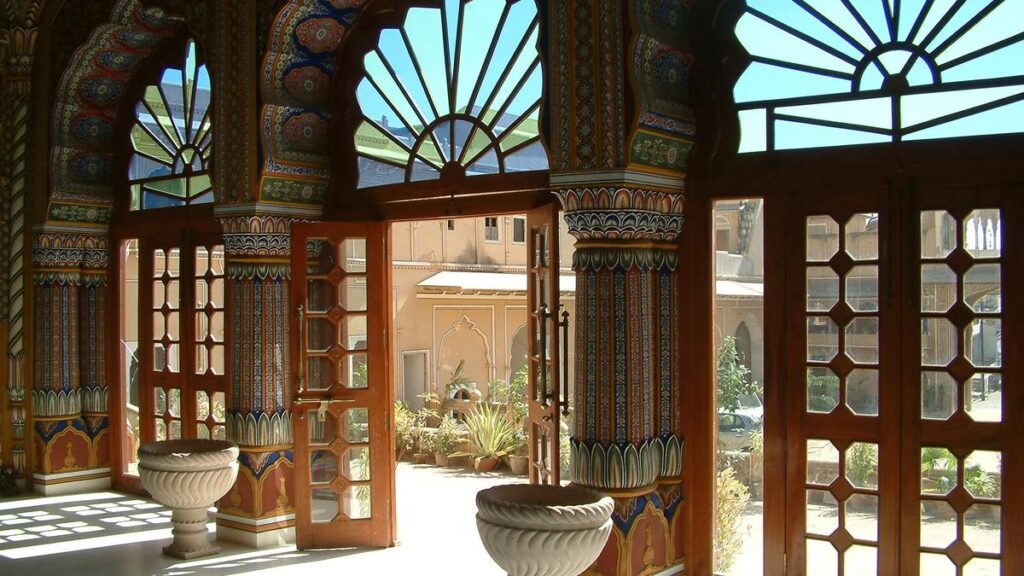Furniture and collectibles from Evoke, the design store in London’s chic Marylebone area, can be found in tony drawing rooms across the world. Run by Sridhar Poddar and his mum Vandana Poddar, it showcases crafts from across the world, but with a special focus on India and Africa. “All craft forms are interconnected. They have a universal language,” says Vandana, who was born in South Africa to a Gujarati family. “Both India and Africa are rich in tribal communities whose craft traditions are inspired by nature and utility.”
Some of Evoke’s collectibles are on exhibit in Bengaluru, at Kaash, the studio-cum-residency that also has the mother and son’s stamp. Shields from Cameroon, textile artworks from Ahmedabad, and sculptures from Zimbabwe dot the gallery space inside the 200-year-old villa in Langford Town. “The masks from Tanzania are similar to the bhuta masks of Kerala and Karnataka, and the beaded Yoruba chairs remind you of the beadwork practised in Kutch and Saurashtra in Gujarat,” shares Vandana, underlining the commonalities between crafts.
Vandana Poddar with Leonora Stathakis
Yoruba crowns and beaded chairs from Nigeria are some of the highlights of the show. The cone-shaped blue-and-white beaded headpieces, worn by the Oba (king) to underline his role as a divine leader, are adorned with geometric forms and fauna. The Makonde body masks, representing a pregnant woman with a protruding stomach and rounded breasts, are another eye-catcher, harking to the tribe’s matrilineal heritage.
“With this exhibition, we wanted to bring Evoke to [India and] Kaash. The store opened in 2021, and Kaash was born in 2022. And it all started with Yoruba chairs,” says Sridhar. “My mother wanted a pair for our home in Bengaluru. So, I was tracking a collection of these, but instead of getting them for the house, we ended up deciding to open a store [with interior designer Leonora Stathakis].” The response so far has been overwhelming, he says, “with people calling from all over the country to acquire the Yoruba chairs and terracotta Zulu pots”.
Pushing the craft collectible
The show is curated by Sridhar and Stathakis. “This is a decor show, with crafts from a different geographical location. We wanted to highlight the continuity of tradition,” says Sridhar, adding, “We want to build a commercial aspect around craft. It is an appreciating product. We call it craft collectible.”
Sridhar Poddar and Manju Sara Rajan
At Kaash, which is also a production platform, collaborations take place between designers and artisans — identifying new forms and experimenting with new materials. But Vandana and Sridhar are clear that while they like to encourage traditional art forms, they don’t work with antiques. The charpoy suspended from the wall, made with Kuba textile from Congo, is a good entry point into their curatorial premise — and what drew actor Sonam Kapoor Ahuja to them. An ode to the traditional woven bed, it gets a contemporary twist as a ballam bench [with legs inspired by ballam, the Indian exercise club]. The charpoy has pride of place in Ahuja’s home office.
Ilala palm fibre baskets from Zimbabwe
Also at Kaash
Last week, Darshanam opened at the galley, showcasing 24 silk sculptures by textile designer Jayshree Poddar — representing the Devi — and sculptural dokhra diyas by Italian visual artist Andrea Anastasio. The multidisciplinary show represents the female Hindu deity in abstract textile artworks and a series of illuminated terracotta masks dressed in silk. The works were executed at Kaash.
Evoke is a popular stop with moneyed Indian travellers. British Indian artist Anish Kapoor was impressed by their Yoruba chairs, while interior designer Vinita Chaitanya, who designed Deepika Padukone and Ranveer Singh’s house in Mumbai, is a frequent visitor. “Social media fosters access to different cultures, inspiring people to have multi-cultural pieces at home,” says Sridhar, who sources the pieces from fairs, craft communities and through his travels. Ironically, however, he says they “still don’t have a Yoruba chair at home”.
Three in focus
Vandana, Sridhar and Manju Sara Rajan, co-founder of Kaash Foundation, choose their favourite:
Bamoun chief necklace: The ancient bronze alloy necklace from Cameroon symbolises wealth and prestige among the Bamoun tribe. The slender design with buffalo motifs, representing strength and resilience, has been made using the lost wax technique. “I find it akin to a prabhavali, the brass arch that frames the deity in South Indian temples,” says Vandana. “It gives the impression of a halo around the deity.”
Asami Nagashima Sarabhai’s blue textile screen: “The African objects in the room — from the beaded chair to the crown — have a strong presence, but this work softens the show,” notes Rajan. Sarabhai, the founder of Rasai, a multidisciplinary textile-based label, made the textile work after seeing the blue Yoruba crown. It features architectural elements of Kaash, the African objects and her own brand.
Constellation vase: Rendered in bidri, the silver inlay on zinc and copper alloy, oxidised with black clay, is a stunning piece that draws from the constellations in the night sky. “It’s interesting that when people see it, they feel it’s very African,” says Sridhar. “I love how the craft of bidri has been contemporised. This piece speaks to the other objects in the room.”
The exhibition is on till November 17 at Kaash.
The Bengaluru-based journalist writes on art, culture, health and social welfare.
Published – November 01, 2024 12:23 pm IST
Related Topics
Source Homevior.in




